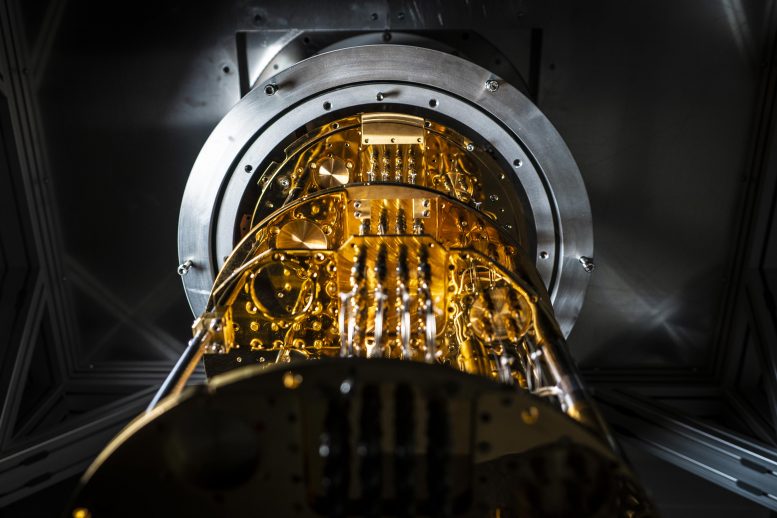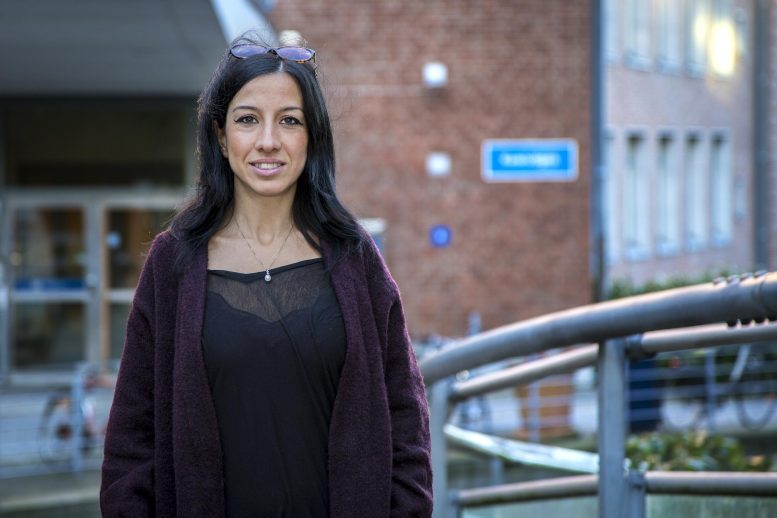
Researchers at Chalmers University of Technology, Sweden, have now shown that they can solve a small part of a real logistics problem with their small, but well-functioning quantum computer.
Quantum computers have already managed to surpass ordinary computers in solving certain tasks – unfortunately, totally useless ones. The next milestone is to get them to do useful things. Researchers at Chalmers University of Technology, Sweden, have now shown that they can solve a small part of a real logistics problem with their small, but well-functioning quantum computer.
Interest in building quantum computers has gained considerable momentum in recent years, and feverish work is underway in many parts of the world. In 2019, Google’s research team made a major breakthrough when their quantum computer managed to solve a task far more quickly than the world’s best supercomputer. The downside is that the solved task had no practical use whatsoever – it was chosen because it was judged to be easy to solve for a quantum computer, yet very difficult for a conventional computer.
Therefore, an important task is now to find useful, relevant problems that are beyond the reach of ordinary computers, but which a relatively small quantum computer could solve.

“We want to be sure that the quantum computer we are developing can help solve relevant problems early on. Therefore, we work in close collaboration with industrial companies,” says theoretical physicist Giulia Ferrini, one of the leaders of Chalmers University of Technology’s quantum computer project, which began in 2018.
Together with Göran Johansson, Giulia Ferrini led the theoretical work when a team of researchers at Chalmers, including an industrial doctoral student from the aviation logistics company Jeppesen, recently showed that a quantum computer can solve an instance of a real problem in the aviation industry.
The algorithm proven on two qubits
All airlines are faced with scheduling problems. For example, assigning individual aircraft to different routes represents an optimization problem, one that grows very rapidly in size and complexity as the number of routes and aircraft increases.
Researchers hope that quantum computers will eventually be better at handling such problems than today’s computers. The basic building block of the quantum computer – the qubit – is based on completely different principles than the building blocks of today’s computers, allowing them to handle enormous amounts of information with relatively few qubits.

However, due to their different structure and function, quantum computers must be programmed in other ways than conventional computers. One proposed algorithm that is believed to be useful on early quantum computers is the so-called Quantum Approximate Optimization Algorithm (QAOA).
The Chalmers research team has now successfully executed said algorithm on their quantum computer – a processor with two qubits – and they showed that it can successfully solve the problem of assigning aircraft to routes. In this first demonstration, the result could be easily verified as the scale was very small – it involved only two airplanes.
Potential to handle many aircraft
With this feat, the researchers were the first to show that the QAOA algorithm can solve the problem of assigning aircraft to routes in practice. They also managed to run the algorithm one level further than anyone before, an achievement that requires very good hardware and accurate control.
“We have shown that we have the ability to map relevant problems onto our quantum processor. We still have a small number of qubits, but they work well. Our plan has been to first make everything work very well on a small scale, before scaling up,” says Jonas Bylander, senior researcher responsible for the experimental design, and one of the leaders of the project of building a quantum computer at Chalmers.
The theorists in the research team also simulated solving the same optimization problem for up to 278 aircraft, which would require a quantum computer with 25 qubits.
“The results remained good as we scaled up. This suggests that the QAOA algorithm has the potential to solve this type of problem at even larger scales,” says Giulia Ferrini.
Surpassing today’s best computers would, however, require much larger devices. The researchers at Chalmers have now begun scaling up and are currently working with five quantum bits. The plan is to reach at least 20 qubits by 2021 while maintaining the high quality.
The research results have been published in two articles in Physical Review Applied.
References:
“Improved Success Probability with Greater Circuit Depth for the Quantum Approximate Optimization Algorithm” by Andreas Bengtsson, Pontus Vikstål, Christopher Warren, Marika Svensson, Xiu Gu, Anton Frisk Kockum, Philip Krantz, Christian Križan, Daryoush Shiri, Ida-Maria Svensson, Giovanna Tancredi, Göran Johansson, Per Delsing, Giulia Ferrini and Jonas Bylander, 3 September 2020, Physical Review Applied.
DOI: 10.1103/PhysRevApplied.14.034010
“Applying the Quantum Approximate Optimization Algorithm to the Tail-Assignment Problem” by Pontus Vikstål, Mattias Grönkvist, Marika Svensson, Martin Andersson, Göran Johansson and Giulia Ferrini, 3 September 2020, Physical Review Applied.
DOI: 10.1103/PhysRevApplied.14.034009
More about: The Swedish quest for a quantum computer
The research is part of the Wallenberg Centre for Quantum Technology (WACQT), a twelve-year, billion-dollar investment with two main purposes: to develop Swedish expertise in quantum technology, and to build a useful quantum computer with at least one hundred quantum bits. The research centre is mainly funded by the Knut and Alice Wallenberg Foundation.
Never miss a breakthrough: Join the SciTechDaily newsletter.
4 Comments
And the U.S. has how many quantum computers? How would we know? Is this something the govt. would want us all to know? We are in a Gen. 6 war as you read this. And it isn’t going to be slowed or stopped as time goes onward.
What is “Gen 6 War” ??
War with who ??
Please elaborate.
Thank.
The real question one would have to ask would be if computers are developed by humans then to be programmed to carry out tasks with curtain amount of data that it needs to complete, then why would one believe that we are the ones that are programmed with only select amount of data to perform our obligation of believing we are human. Which the government believe they have control and power as time will show that they do not have any control or power as they to are doing what they need to for a master plan which has been planned out which is for the greater good
Jim..these are eyes of the Beholder and therein lies the mystery and miseries of those effected by Covid 19.
Shouldn’t we go back in time and be sure there’s something for Everyone to eat, place to rest , eventually God will still have another sympathetic ear to feel our remorse Situations